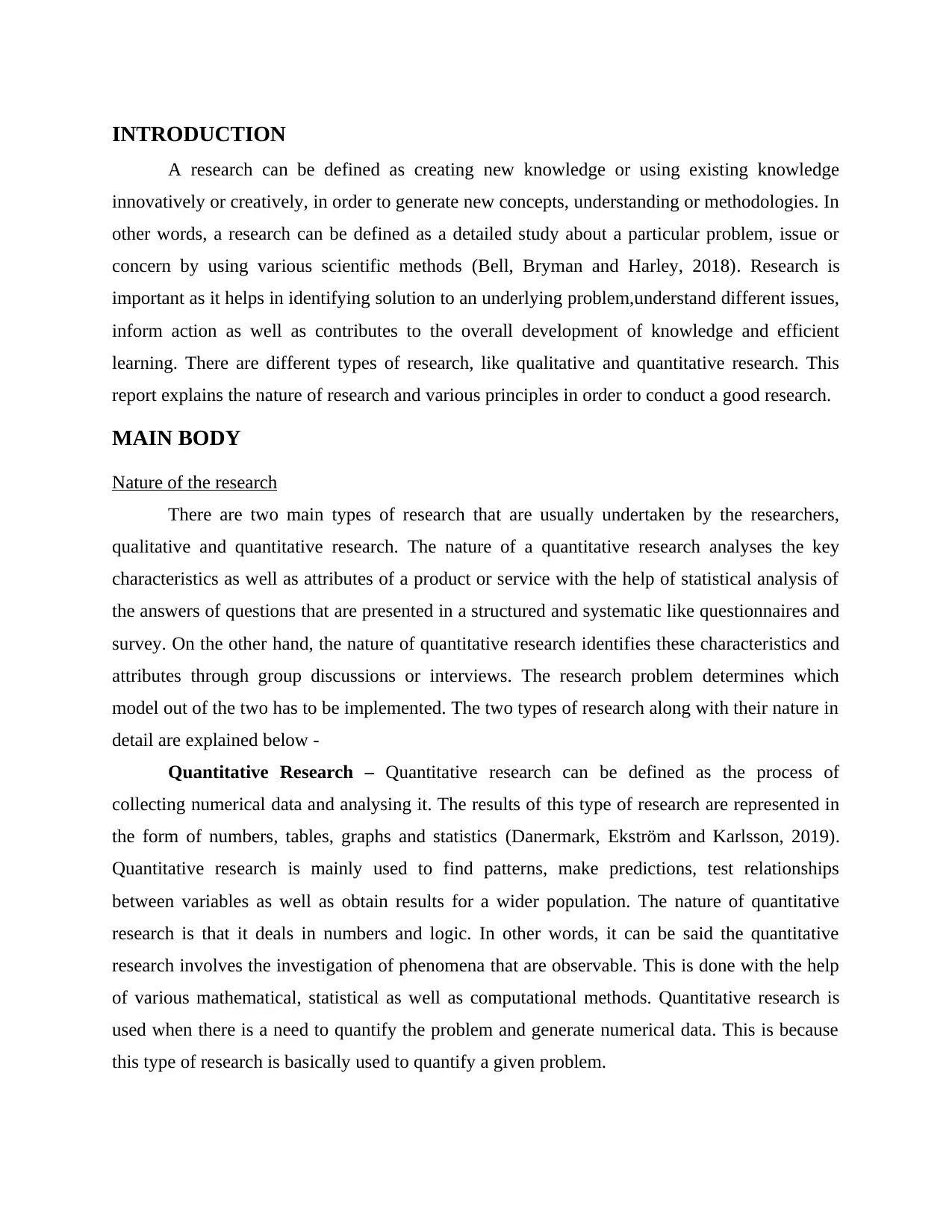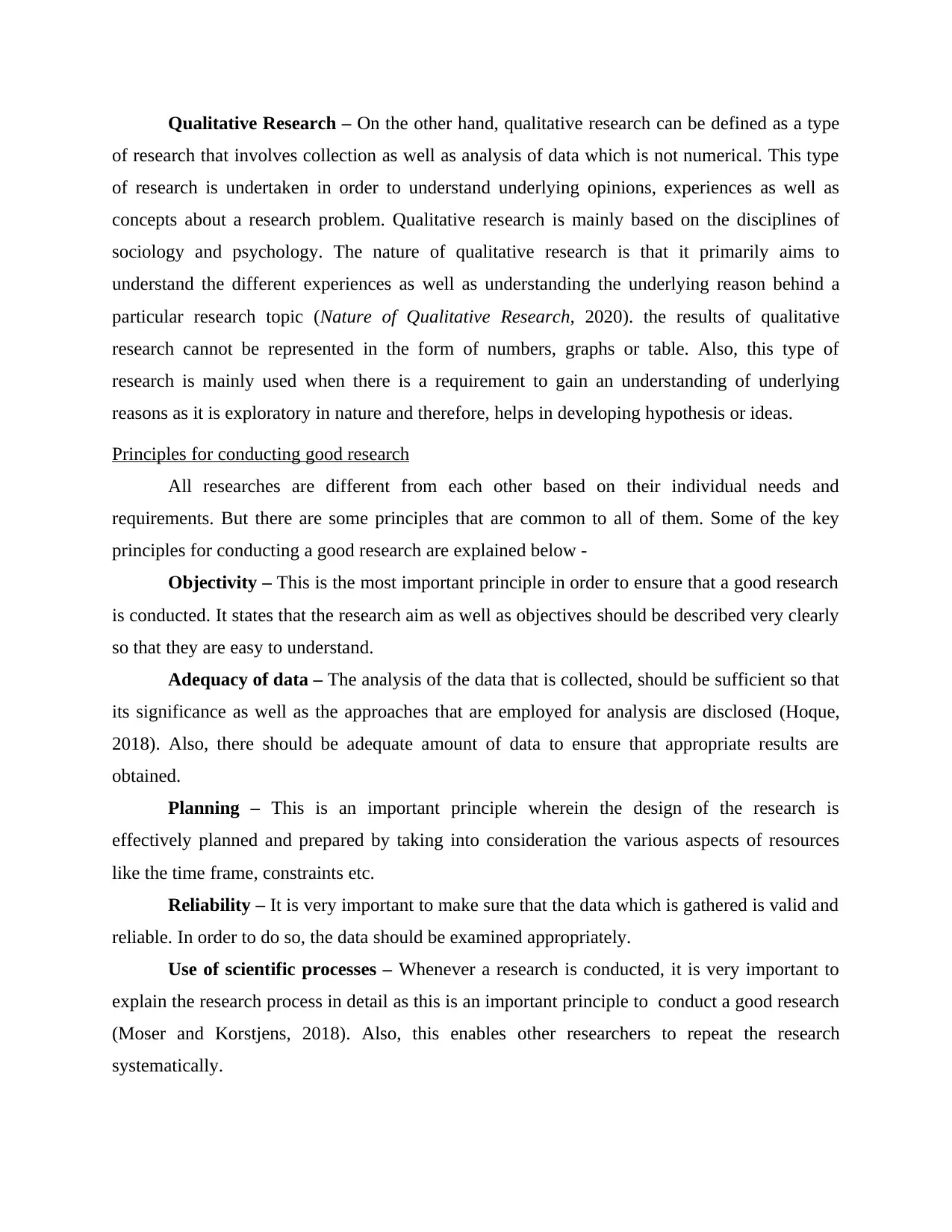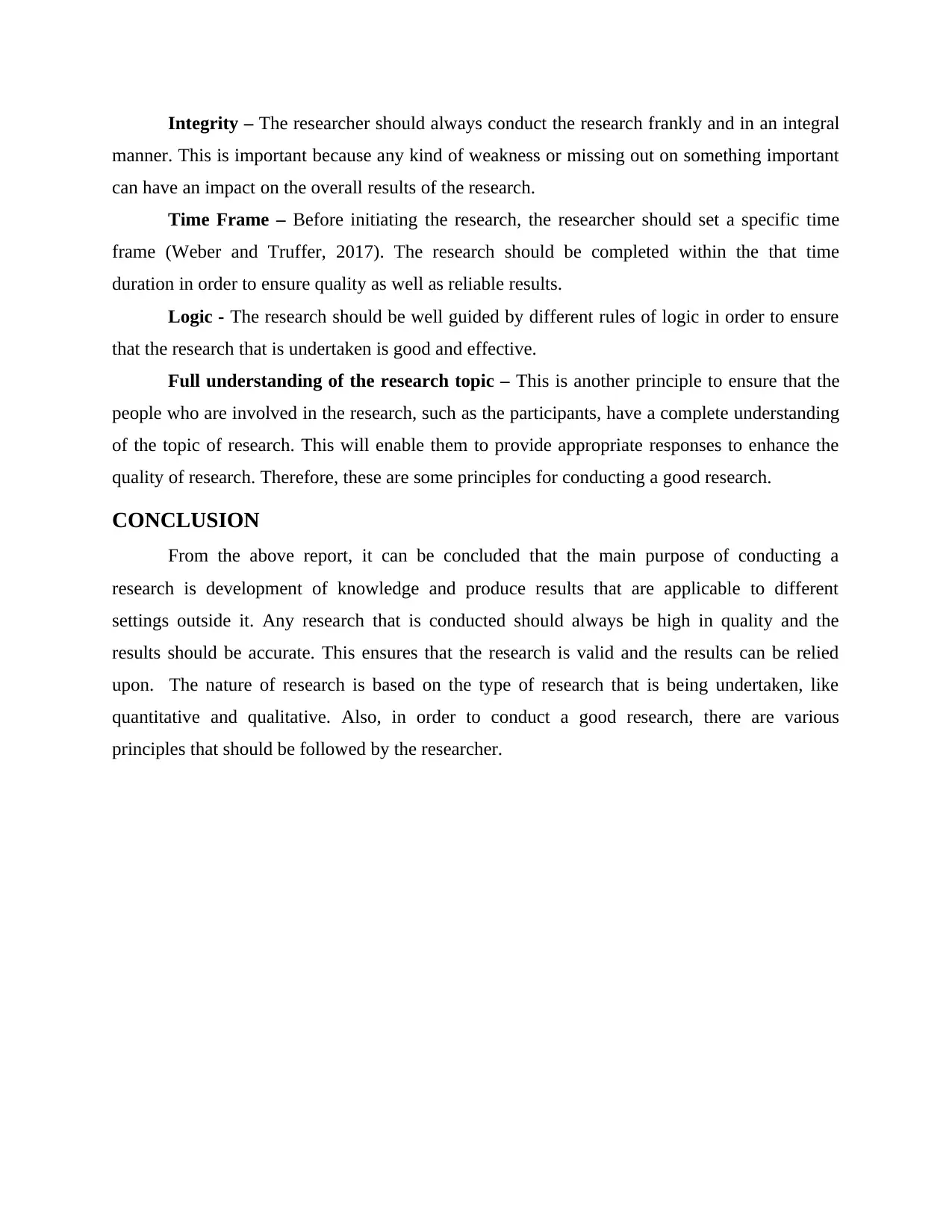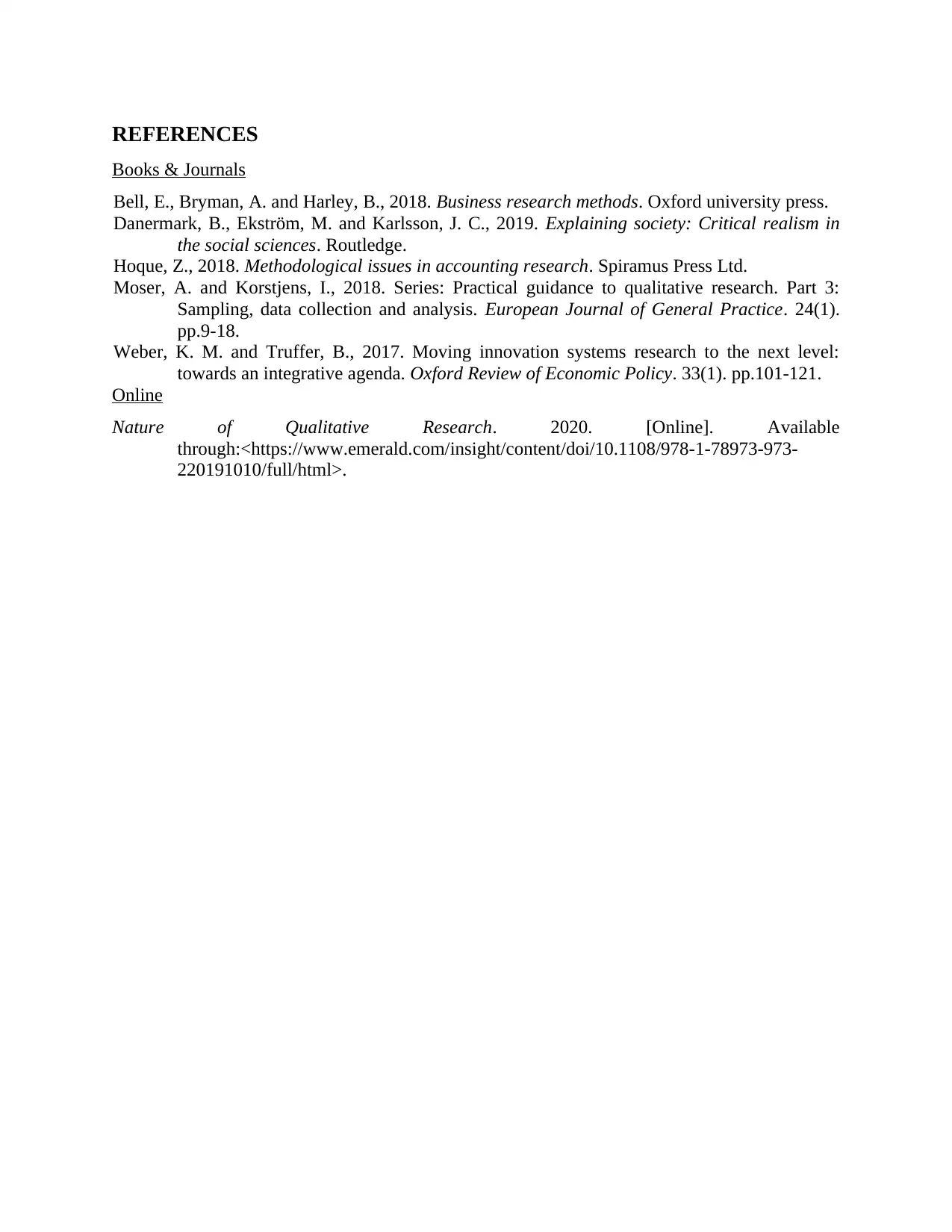Report on the Nature of Research and Principles for Good Research
VerifiedAdded on 2023/01/06
|6
|1329
|82
Report
AI Summary
This report provides an overview of the nature of research, differentiating between qualitative and quantitative research methodologies. It explains that quantitative research uses numerical data and statistical analysis, while qualitative research focuses on non-numerical data to understand underlying opinions and experiences. The report further outlines the principles for conducting good research, including objectivity, adequacy of data, planning, reliability, use of scientific processes, integrity, time frame, logic, and a full understanding of the research topic. The conclusion emphasizes the importance of high-quality research with accurate and reliable results, highlighting the significance of adhering to these principles for effective knowledge development and applicable outcomes. The report is well-structured with an introduction, main body, conclusion, and references.

Nature of Research and
the Principles for
Conducting Good
Research
the Principles for
Conducting Good
Research
Paraphrase This Document
Need a fresh take? Get an instant paraphrase of this document with our AI Paraphraser

Table of Contents
INTRODUCTION...........................................................................................................................3
MAIN BODY...................................................................................................................................3
Nature of the research.............................................................................................................3
Principles for conducting good research................................................................................4
CONCLUSION................................................................................................................................5
REFERENCES................................................................................................................................6
INTRODUCTION...........................................................................................................................3
MAIN BODY...................................................................................................................................3
Nature of the research.............................................................................................................3
Principles for conducting good research................................................................................4
CONCLUSION................................................................................................................................5
REFERENCES................................................................................................................................6

INTRODUCTION
A research can be defined as creating new knowledge or using existing knowledge
innovatively or creatively, in order to generate new concepts, understanding or methodologies. In
other words, a research can be defined as a detailed study about a particular problem, issue or
concern by using various scientific methods (Bell, Bryman and Harley, 2018). Research is
important as it helps in identifying solution to an underlying problem,understand different issues,
inform action as well as contributes to the overall development of knowledge and efficient
learning. There are different types of research, like qualitative and quantitative research. This
report explains the nature of research and various principles in order to conduct a good research.
MAIN BODY
Nature of the research
There are two main types of research that are usually undertaken by the researchers,
qualitative and quantitative research. The nature of a quantitative research analyses the key
characteristics as well as attributes of a product or service with the help of statistical analysis of
the answers of questions that are presented in a structured and systematic like questionnaires and
survey. On the other hand, the nature of quantitative research identifies these characteristics and
attributes through group discussions or interviews. The research problem determines which
model out of the two has to be implemented. The two types of research along with their nature in
detail are explained below -
Quantitative Research – Quantitative research can be defined as the process of
collecting numerical data and analysing it. The results of this type of research are represented in
the form of numbers, tables, graphs and statistics (Danermark, Ekström and Karlsson, 2019).
Quantitative research is mainly used to find patterns, make predictions, test relationships
between variables as well as obtain results for a wider population. The nature of quantitative
research is that it deals in numbers and logic. In other words, it can be said the quantitative
research involves the investigation of phenomena that are observable. This is done with the help
of various mathematical, statistical as well as computational methods. Quantitative research is
used when there is a need to quantify the problem and generate numerical data. This is because
this type of research is basically used to quantify a given problem.
A research can be defined as creating new knowledge or using existing knowledge
innovatively or creatively, in order to generate new concepts, understanding or methodologies. In
other words, a research can be defined as a detailed study about a particular problem, issue or
concern by using various scientific methods (Bell, Bryman and Harley, 2018). Research is
important as it helps in identifying solution to an underlying problem,understand different issues,
inform action as well as contributes to the overall development of knowledge and efficient
learning. There are different types of research, like qualitative and quantitative research. This
report explains the nature of research and various principles in order to conduct a good research.
MAIN BODY
Nature of the research
There are two main types of research that are usually undertaken by the researchers,
qualitative and quantitative research. The nature of a quantitative research analyses the key
characteristics as well as attributes of a product or service with the help of statistical analysis of
the answers of questions that are presented in a structured and systematic like questionnaires and
survey. On the other hand, the nature of quantitative research identifies these characteristics and
attributes through group discussions or interviews. The research problem determines which
model out of the two has to be implemented. The two types of research along with their nature in
detail are explained below -
Quantitative Research – Quantitative research can be defined as the process of
collecting numerical data and analysing it. The results of this type of research are represented in
the form of numbers, tables, graphs and statistics (Danermark, Ekström and Karlsson, 2019).
Quantitative research is mainly used to find patterns, make predictions, test relationships
between variables as well as obtain results for a wider population. The nature of quantitative
research is that it deals in numbers and logic. In other words, it can be said the quantitative
research involves the investigation of phenomena that are observable. This is done with the help
of various mathematical, statistical as well as computational methods. Quantitative research is
used when there is a need to quantify the problem and generate numerical data. This is because
this type of research is basically used to quantify a given problem.
⊘ This is a preview!⊘
Do you want full access?
Subscribe today to unlock all pages.

Trusted by 1+ million students worldwide

Qualitative Research – On the other hand, qualitative research can be defined as a type
of research that involves collection as well as analysis of data which is not numerical. This type
of research is undertaken in order to understand underlying opinions, experiences as well as
concepts about a research problem. Qualitative research is mainly based on the disciplines of
sociology and psychology. The nature of qualitative research is that it primarily aims to
understand the different experiences as well as understanding the underlying reason behind a
particular research topic (Nature of Qualitative Research, 2020). the results of qualitative
research cannot be represented in the form of numbers, graphs or table. Also, this type of
research is mainly used when there is a requirement to gain an understanding of underlying
reasons as it is exploratory in nature and therefore, helps in developing hypothesis or ideas.
Principles for conducting good research
All researches are different from each other based on their individual needs and
requirements. But there are some principles that are common to all of them. Some of the key
principles for conducting a good research are explained below -
Objectivity – This is the most important principle in order to ensure that a good research
is conducted. It states that the research aim as well as objectives should be described very clearly
so that they are easy to understand.
Adequacy of data – The analysis of the data that is collected, should be sufficient so that
its significance as well as the approaches that are employed for analysis are disclosed (Hoque,
2018). Also, there should be adequate amount of data to ensure that appropriate results are
obtained.
Planning – This is an important principle wherein the design of the research is
effectively planned and prepared by taking into consideration the various aspects of resources
like the time frame, constraints etc.
Reliability – It is very important to make sure that the data which is gathered is valid and
reliable. In order to do so, the data should be examined appropriately.
Use of scientific processes – Whenever a research is conducted, it is very important to
explain the research process in detail as this is an important principle to conduct a good research
(Moser and Korstjens, 2018). Also, this enables other researchers to repeat the research
systematically.
of research that involves collection as well as analysis of data which is not numerical. This type
of research is undertaken in order to understand underlying opinions, experiences as well as
concepts about a research problem. Qualitative research is mainly based on the disciplines of
sociology and psychology. The nature of qualitative research is that it primarily aims to
understand the different experiences as well as understanding the underlying reason behind a
particular research topic (Nature of Qualitative Research, 2020). the results of qualitative
research cannot be represented in the form of numbers, graphs or table. Also, this type of
research is mainly used when there is a requirement to gain an understanding of underlying
reasons as it is exploratory in nature and therefore, helps in developing hypothesis or ideas.
Principles for conducting good research
All researches are different from each other based on their individual needs and
requirements. But there are some principles that are common to all of them. Some of the key
principles for conducting a good research are explained below -
Objectivity – This is the most important principle in order to ensure that a good research
is conducted. It states that the research aim as well as objectives should be described very clearly
so that they are easy to understand.
Adequacy of data – The analysis of the data that is collected, should be sufficient so that
its significance as well as the approaches that are employed for analysis are disclosed (Hoque,
2018). Also, there should be adequate amount of data to ensure that appropriate results are
obtained.
Planning – This is an important principle wherein the design of the research is
effectively planned and prepared by taking into consideration the various aspects of resources
like the time frame, constraints etc.
Reliability – It is very important to make sure that the data which is gathered is valid and
reliable. In order to do so, the data should be examined appropriately.
Use of scientific processes – Whenever a research is conducted, it is very important to
explain the research process in detail as this is an important principle to conduct a good research
(Moser and Korstjens, 2018). Also, this enables other researchers to repeat the research
systematically.
Paraphrase This Document
Need a fresh take? Get an instant paraphrase of this document with our AI Paraphraser

Integrity – The researcher should always conduct the research frankly and in an integral
manner. This is important because any kind of weakness or missing out on something important
can have an impact on the overall results of the research.
Time Frame – Before initiating the research, the researcher should set a specific time
frame (Weber and Truffer, 2017). The research should be completed within the that time
duration in order to ensure quality as well as reliable results.
Logic - The research should be well guided by different rules of logic in order to ensure
that the research that is undertaken is good and effective.
Full understanding of the research topic – This is another principle to ensure that the
people who are involved in the research, such as the participants, have a complete understanding
of the topic of research. This will enable them to provide appropriate responses to enhance the
quality of research. Therefore, these are some principles for conducting a good research.
CONCLUSION
From the above report, it can be concluded that the main purpose of conducting a
research is development of knowledge and produce results that are applicable to different
settings outside it. Any research that is conducted should always be high in quality and the
results should be accurate. This ensures that the research is valid and the results can be relied
upon. The nature of research is based on the type of research that is being undertaken, like
quantitative and qualitative. Also, in order to conduct a good research, there are various
principles that should be followed by the researcher.
manner. This is important because any kind of weakness or missing out on something important
can have an impact on the overall results of the research.
Time Frame – Before initiating the research, the researcher should set a specific time
frame (Weber and Truffer, 2017). The research should be completed within the that time
duration in order to ensure quality as well as reliable results.
Logic - The research should be well guided by different rules of logic in order to ensure
that the research that is undertaken is good and effective.
Full understanding of the research topic – This is another principle to ensure that the
people who are involved in the research, such as the participants, have a complete understanding
of the topic of research. This will enable them to provide appropriate responses to enhance the
quality of research. Therefore, these are some principles for conducting a good research.
CONCLUSION
From the above report, it can be concluded that the main purpose of conducting a
research is development of knowledge and produce results that are applicable to different
settings outside it. Any research that is conducted should always be high in quality and the
results should be accurate. This ensures that the research is valid and the results can be relied
upon. The nature of research is based on the type of research that is being undertaken, like
quantitative and qualitative. Also, in order to conduct a good research, there are various
principles that should be followed by the researcher.

REFERENCES
Books & Journals
Bell, E., Bryman, A. and Harley, B., 2018. Business research methods. Oxford university press.
Danermark, B., Ekström, M. and Karlsson, J. C., 2019. Explaining society: Critical realism in
the social sciences. Routledge.
Hoque, Z., 2018. Methodological issues in accounting research. Spiramus Press Ltd.
Moser, A. and Korstjens, I., 2018. Series: Practical guidance to qualitative research. Part 3:
Sampling, data collection and analysis. European Journal of General Practice. 24(1).
pp.9-18.
Weber, K. M. and Truffer, B., 2017. Moving innovation systems research to the next level:
towards an integrative agenda. Oxford Review of Economic Policy. 33(1). pp.101-121.
Online
Nature of Qualitative Research. 2020. [Online]. Available
through:<https://www.emerald.com/insight/content/doi/10.1108/978-1-78973-973-
220191010/full/html>.
Books & Journals
Bell, E., Bryman, A. and Harley, B., 2018. Business research methods. Oxford university press.
Danermark, B., Ekström, M. and Karlsson, J. C., 2019. Explaining society: Critical realism in
the social sciences. Routledge.
Hoque, Z., 2018. Methodological issues in accounting research. Spiramus Press Ltd.
Moser, A. and Korstjens, I., 2018. Series: Practical guidance to qualitative research. Part 3:
Sampling, data collection and analysis. European Journal of General Practice. 24(1).
pp.9-18.
Weber, K. M. and Truffer, B., 2017. Moving innovation systems research to the next level:
towards an integrative agenda. Oxford Review of Economic Policy. 33(1). pp.101-121.
Online
Nature of Qualitative Research. 2020. [Online]. Available
through:<https://www.emerald.com/insight/content/doi/10.1108/978-1-78973-973-
220191010/full/html>.
⊘ This is a preview!⊘
Do you want full access?
Subscribe today to unlock all pages.

Trusted by 1+ million students worldwide
1 out of 6
Related Documents
Your All-in-One AI-Powered Toolkit for Academic Success.
+13062052269
info@desklib.com
Available 24*7 on WhatsApp / Email
![[object Object]](/_next/static/media/star-bottom.7253800d.svg)
Unlock your academic potential
Copyright © 2020–2026 A2Z Services. All Rights Reserved. Developed and managed by ZUCOL.





